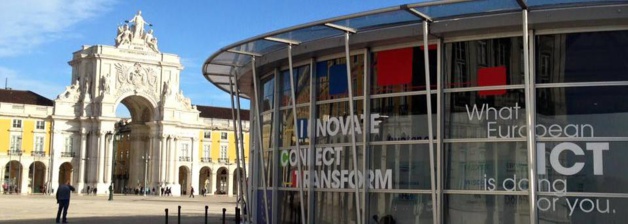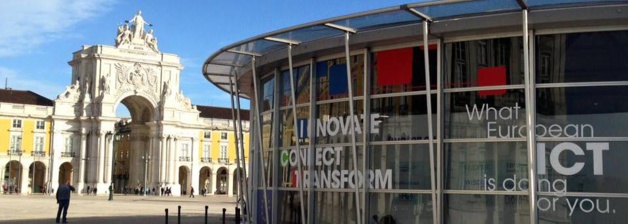
Over 7,000 exhibitors from public and private organisms who benefit from European funding for projects concerning new digital technologies met up at the Congress Centre in Lisbon. The ICT 2015 is the support for promoting the goals set by the European Union concerning digital economy. It also allowed many constructive networking opportunities for the participants.
As of the first opening words, the European Commission set the tone: digital technologies are currently thoroughly transforming the European economy. From the transport of merchandise to education, as well as personal services, these are all parts of our society that will be affected by the evolution towards a digital economy. In the same way that motors and electricity brought on changes towards industrial societies, then to services, digital technologies are going to create a new “Industry 4.0” according to Günther Oettinger, European commissioner for the Digital Economy.
This is the reason that in 2016, the European Union would like to rapidly be a part of this change and create a unique digital market. However, this won’t be possible without close cooperation between public and private partners, but especially not without investments in ambitious projects. Through this strategy, the European Union is hoping to become the leader of the global digital market.
A digital transition backed by the European Commission
Among projects funded by the Commission that were presented during the ICT 2015 conference, we discovered a number of ideas and denominations that were equal parts unlikely and futuristic. The recurring words appeared to be “smart cities”, “5G”, “digital skills”, “Big data”, or even “connected objects”. The best projects were rewarded by the students present at the conference, they reflect the diversity of the subjects covered by the European Union.
The Human Brain project especially, created a close link between research on intelligent digital technologies inspired by our neurological structure and the development of technologies created to heal brain diseases. Concerning education, the No one left behind project allows school children to program video games for teaching purposes, and Monarch, a robot that teaches children. These all refer to “Code week” which reflects the will of the EU to favour the learning of digital skills. Finally, we got to see the USEMP project which uses its technology to allow users to have more control over their personal data online.

Robots from the USEMP project – Credit to Clarisse Boyer
What is the “unique digital market” advocated by the Juncker Commission? Creating a unique market has been the basis of the European Union since 1957. This market has progressively expanded to domains other than economy after each treaty. The creation of this unique digital market falls into this perspective. Its goal is to remove the last barriers that hinder the free movement of trade between all Member States. But beyond the potential positive effects on the European economy, the creation of a unique digital market could have even bigger consequences in terms of education, access to public services, protection of personal data online, or even managing our natural environment.
What about the effects on our society?
Some of the main challenges of the development of the digital economy are the irreversible repercussions on the state of our society. This has regularly been at the centre of the conferences held within the 2015 ICT conference. Participants and exhibitors questioned which direction to take concerning the development of new technologies. Would these new technologies accompany us or replace us when it comes to completing daily tasks? What do we think about resorting to robots in the work, health, education and even government domains in terms of the evolution of the job and social responsibility markets? Will computer language become the next universal language? And how can we not be blinded by al the economic benefits that make us mirror digital technologies, risking deteriorating our social fabric?
The ICT 2015 conference put forward the progression and investments made by the European Union in favour of the creation of a digital economy. But faced with the obvious economic interests that are at the root of this policy, societal backlash are still undefined and don’t seem to have been anticipated. If developing a digital economy has been undertaken on a European level, it’s left up to the Member States to accompany the societal transition that this kind of economy will generate.





























